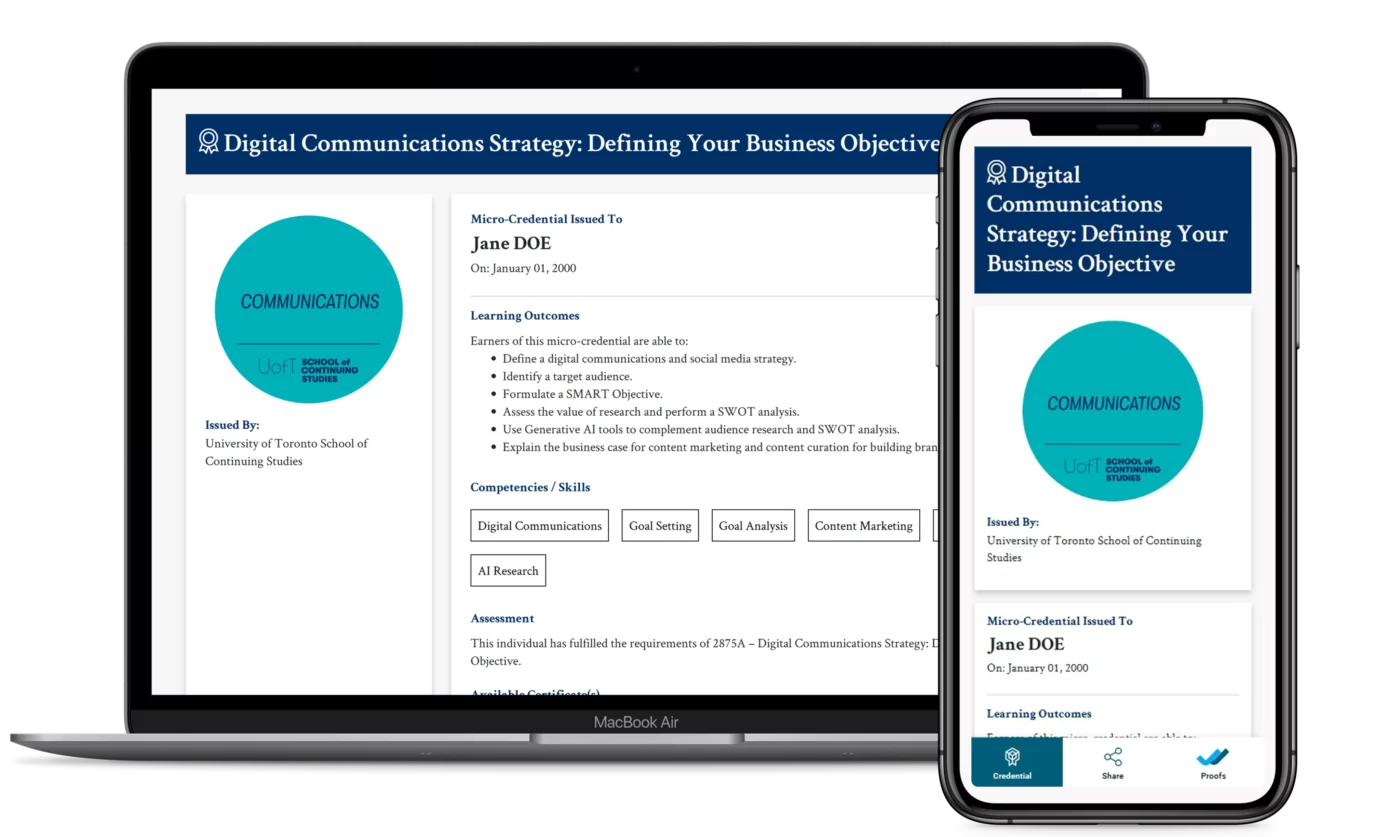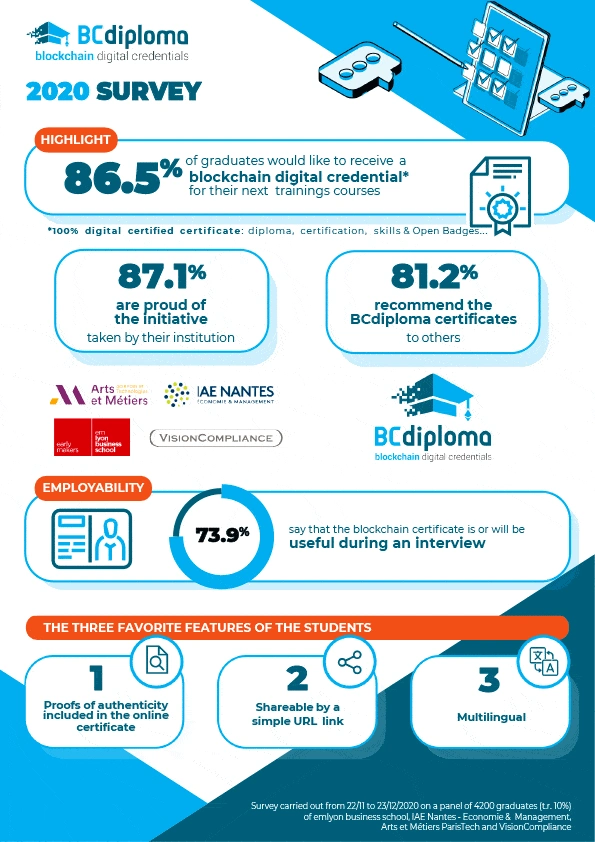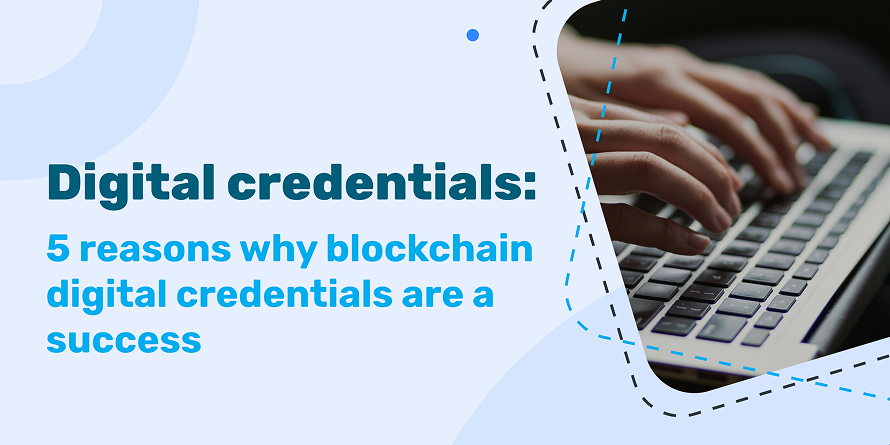What are the “digital credentials”?
Digital credentials are 100% digital, tamper-proof and verifiable certificates. Generally issued by institutions, these credentials can represent diplomas, skills, or transcripts in the education and training sector. Blockchain technology now allows for the issuance and storage of these documents, and provides a secure way to authenticate them.
This new credentialing process is supporting the fight against academic fraud, offering learners lifetime access to authenticate certificates, which can be freely used and instantly verified, making the verification process a seamless task. This type of credential is highly adapted to our increasingly digital professional lives and careers, as evidenced by the prominent role of platforms such as LinkedIn and other social and professional networks.
Digital micro-credentials and open badges, an image- or icon-based form of micro-credential, are also powerful tools for the digitalization and therefore dematerialization of management processes in higher education, continuing education and training organizations.

In this article, we explain the development of blockchain, and go on to list the 5 reasons why students find the blockchain digital credential solution useful for their employability and for administrative procedures.
A recent survey of students shows that more than 85% wish to continue receiving these “blockchain digital credentials” for their future training courses!
What is the blockchain?
Blockchain is a secure and transparent information storage and transmission system that builds trust in digital records. Explained by mathematician and computer scientist Jean-Paul Delahaye, “a blockchain is a large ledger that is open and accessible to all in reading and writing, and that is shared on a large number of computers around the world”. With the data and all handling operations stored irreversibly in a decentralized registry, a hallmark of such systems, the ledger can be viewed by everyone in so-called public blockchains.
Here are a few key dates that have marked the development of blockchain:
- 2009: The creation of the Bitcoin blockchain, as a transactional platform.
- 2015: The launch of the Ethereum blockchain project, which allows for the deployment of applications within the blockchain.
- 2020: The first step in the deployment of Ethereum 2.0, shaping the future of secure data exchange with high scalability and reduced energy consumption.
These developments have paved the way for widespread use and provide a well-reasoned response to criticisms of the technology’s energy consumption.
Why is blockchain a reliable and long-lasting technology?
Blockchain is a secure technology “by design”. It is designed so that, through the use of cryptography and decentralization, information stored there cannot be altered. Decentralization, in the case of blockchain, is a peer-to-peer principle that allows a large number of nodes, made up of data storage servers, to faithfully duplicate information. This creates robust systems that ensure the integrity of data across all nodes, guaranteeing resilience, security and a decentralized form of durability.
Blockchain is now used today in the majority of industries and sectors, from supply chain through to finance, government and central banks. Many major international organizations are already widely using it, including, for example: Agence Universitaire de la Francophonie, a global network of French-speaking higher education and research institutions; the World Bank; UNICEF; and the European Commission. Discover more on The Digital Credentials Press Room.
Why do cryptocurrencies and blockchain applications get mixed up?
Since the blockchain is often featured in financial columns, it may be difficult for many to grasp its multiple applications beyond cryptocurrencies. Is it groundbreaking tech or digital banditry, restricted to geeks, or already accessible to all of us? Well, it is important to distinguish between cryptocurrencies like Bitcoin and Ether, which are freely exchangeable assets, and applications that simply use the blockchain to produce a service or infrastructure. The latter are less well-known to the public, leading to widespread confusion. However, blockchain-based applications are more numerous than ever, leveraging the following intrinsic properties:
- Transparency
- Immutability
- Security
- Durability
The first historical and natural application related to the notarization and storage of probative evidence. In the educational field, a step was taken several years ago to solve the question of the authenticity of diplomas, leading to the development of the first verifiable digital credentials, now a recognized use case of blockchain technologies. For more information on the importance of these digital credentials, check out our article on “What Are Digital Credentials and Why Do They Matter?”
5 reasons why blockchain digital credentials are a great success with students
BCdiploma has developed and patented a blockchain platform to certify academic data and provide graduates with unique, tamper-proof, lifelong links. In less than two years, over 100 institutions in as many as 15 countries have started to issue these digital credentials.
During the last quarter of 2020, BCdiploma teams conducted a satisfaction survey to measure the adoption of digital credentials for students in four institutions:
- Arts et Métiers ParisTech, a prestigious French engineering and research graduate school
- IAE Nantes, the School of Economics and Management of the University of Nantes
- Emlyon Business School
- VisionCompliance, the Swiss leader in financial professional training
The results gave 5 reasons why blockchain-secured credentials are great success with students, demonstrating a real enthusiasm for this new format of dematerialized academic certificates:
- 86.5 % said they would like to receive blockchain digital credentials for their next course or degree.
- 87.1 % were proud of the initiative taken by their institution.
- 73.9 % believed that online certificates secured by the blockchain will be useful during a job interview.
- 81.2 % would recommend the certificates issued with the BCdiploma blockchain to their friends and family.
- 66.6 % thought that direct access to the proofs of authenticity of their certificate was the most important feature of digital credentials.

